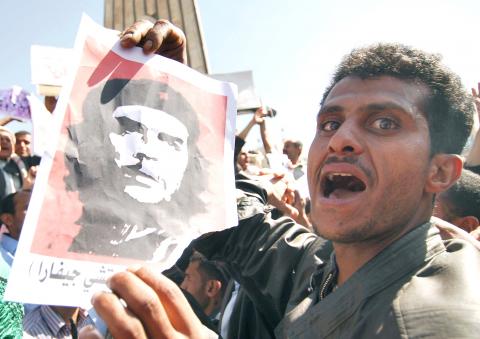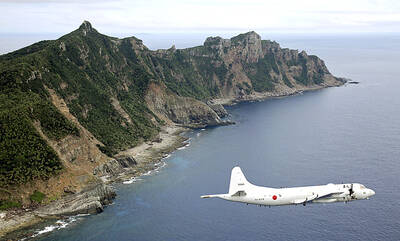Anti-government protesters clashed with police trying to prevent them from marching toward Yemen’s presidential palace in Sana’a yesterday, witnesses said.
Shortly before the clashes, the opposition agreed to enter talks with Yemeni President Ali Abdullah Saleh, who is keen to avert an Egypt-style revolt in the country, a US ally against al-Qaeda.
“The Yemeni people want the fall of the regime,” protesters shouted during the demonstration attended by about 1,000 people, before dozens broke off to march to the palace. “A Yemeni revolution after the Egyptian revolution.”

Photo: AFP
Sporadic anti-government protests have gathered momentum in Yemen. Earlier this month, tens of thousands took part in an opposition-led “Day of Rage” to demand a change of government, inspired by popular protests in Tunisia and Egypt.
Pro and anti-government protesters have clashed in recent days.
Opposition officials said 10 protesters were detained in Sana’a and 120 were taken into custody overnight in the city of Taiz, where authorities broke up a demonstration on Saturday.
Four people were hurt in the Sana’a clashes, in which police hit protesters with batons and demonstrators threw rocks at police, witnesses said.
Saleh, in power for more than three decades and concerned about unrest in some parts of the Arab world, has said he would step down in 2013 and pledged his son will not take over the reins of government. He invited the opposition for talks.
“The opposition does not reject what came in the invitation by the president and is ready to sign an agreement in no more than a week,” said former Yemeni foreign minister Mohammed Basindwa, now an opposition politician, adding that the talks should include Western or Gulf observers.
ALGERIA
Up to 2,000 demonstrators evaded massed police on Saturday to rally in a central Algiers square, calling for Algerian President Abdelaziz Bouteflika to go following the overthrow of leaders in Egypt and Tunisia.
Ringed by hundreds of riot police, some of whom carried automatic weapons in addition to clubs and shields, they waved a large banner reading “Regime, out” and chanted slogans borrowed from the mass protests in Tunis and Cairo.
However, police deployed in their tens of thousands prevented them making a planned 4km march from May 1 Square to Martyrs’ Square.
The demonstrators included both the head of the opposition Rally for Culture and Democracy (RCD), Said Sadi, and his one-time enemy Ali Belhadj, the former leader of the now-banned Islamist Salvation Front.
A knot of police surrounded Sadi to prevent him using a loudspeaker to address the crowd, while a number of arrests were made.
By the afternoon, only about 150 mainly young protesters were left in a corner of the square still chanting defiantly.
However, Fodil Boumala, one of the founders of the National Coordination for Change and Democracy, which called the march, was jubilant.
“We’ve broken the wall of fear, this is only a beginning,” he said. “The Algerians have won back their capital.”
IRAN
Iran’s opposition yesterday renewed its call for a rally in support of protesters in Tunisia and Egypt despite a government warning of repercussions if demonstrations take place, a reformist Web site reported.
In a statement published on -Kaleme.com, the opposition urged its supporters to rally today in central Tehran and accused the government of hypocrisy by voicing support for the Egyptian and Tunisian uprisings while refusing to allow Iranian political activists to stage a peaceful demonstration.
Wary of a reinvigorated opposition at home, Iranian authorities have detained several activists and journalists in recent weeks and opposition leader Mahdi Karroubi was put under house arrest, apparently in connection with the request to stage the rally.
The statement said further restrictions on Karroubi and fellow opposition leader Mir Hossein Mousavi were a sign of the “increasing weakness and fear of the government about the most peaceful civil and political rights” of Iranians.
In another report, Kaleme said many university students as well as a reformist cleric group have promised to attend the rally. However, it was not clear whether the rally would actually take place. Many opposition calls for demonstrations in the past months have gone unheeded.
BAHRAIN
Bahrain’s leaders promised yesterday to expand media freedoms in another apparent attempt to quell plans for the first major anti--government protests in the Gulf since the uprising in Egypt.
The tiny kingdom of Bahrain is among the most politically volatile in the Gulf and holds important strategic value for the West as the home of the US Navy’s Fifth Fleet. Bahrain’s majority Shiites have long complained of discrimination by the ruling Sunni dynasty, whose crackdown on dissent last year touched off riots and clashes.
Shiite-led opposition groups and others have joined calls for demonstrations today — the anniversary of Bahrain’s 2002 Constitution that brought some pro-democracy reforms such as an elected parliament.
Security forces were deployed in malls and other key spots around Bahrain yesterday in a clear warning against holding the rallies, but a prominent human rights activist predicted “chaos and bloodshed” if attempts were made to crush the planned demonstrations.
Bahrain’s leaders, meanwhile, have stepped in with concessions to try to defuse the protests.
Government media monitors began talks yesterday with publishers and others to draft new rules to limit state controls. The Bahrain News Agency, meanwhile, launched a new multimedia service that includes social media applications to seek more outreach.
It’s unclear, however, whether activists and rights groups will be satisfied with the proposed changes after facing widespread blocks on Web sites and blogs.

MISINFORMATION: The generated content tends to adopt China’s official stance, such as ‘Taiwan is currently governed by the Chinese central government,’ the NSB said Five China-developed artificial intelligence (AI) language models exhibit cybersecurity risks and content biases, an inspection conducted by the National Security Bureau (NSB) showed. The five AI tools are: DeepSeek, Doubao (豆包), Yiyan (文心一言), Tongyi (通義千問) and Yuanbao (騰訊元寶), the bureau said, advising people to remain vigilant to protect personal data privacy and corporate business secrets. The NSB said it, in accordance with the National Intelligence Services Act (國家情報工作法), has reviewed international cybersecurity reports and intelligence, and coordinated with the Ministry of Justice Investigation Bureau and the National Police Agency’s Criminal Investigation Bureau to conduct an inspection of China-made AI language

LIMITS: While China increases military pressure on Taiwan and expands its use of cognitive warfare, it is unwilling to target tech supply chains, the report said US and Taiwan military officials have warned that the Chinese People’s Liberation Army (PLA) could implement a blockade within “a matter of hours” and need only “minimal conversion time” prior to an attack on Taiwan, a report released on Tuesday by the US Senate’s China Economic and Security Review Commission said. “While there is no indication that China is planning an imminent attack, the United States and its allies and partners can no longer assume that a Taiwan contingency is a distant possibility for which they would have ample time to prepare,” it said. The commission made the comments in its annual

‘TROUBLEMAKER’: Most countries believe that it is China — rather than Taiwan — that is undermining regional peace and stability with its coercive tactics, the president said China should restrain itself and refrain from being a troublemaker that sabotages peace and stability in the Indo-Pacific region, President William Lai (賴清德) said yesterday. Lai made the remarks after China Coast Guard vessels sailed into disputed waters off the Senkaku Islands — known as the Diaoyutai Islands (釣魚台) in Taiwan — following a remark Japanese Prime Minister Sanae Takaichi made regarding Taiwan. Takaichi during a parliamentary session on Nov. 7 said that a “Taiwan contingency” involving a Chinese naval blockade could qualify as a “survival-threatening situation” for Japan, and trigger Tokyo’s deployment of its military for defense. Asked about the escalating tensions

DISPUTE: A Chinese official prompted a formal protest from Tokyo by saying that ‘the dirty head that sticks itself out must be cut off,’ after Takaichi’s Taiwan remarks Four armed China Coast Guard vessels yesterday morning sailed through disputed waters controlled by Japan, amid a diplomatic spat following Japanese Prime Minister Sanae Takaichi’s comments on Taiwan. The four ships sailed around the Senkaku Islands — known as the Diaoyutai Islands (釣魚台) to Taiwan, and which Taiwan and China also claim — on Saturday before entering Japanese waters yesterday and left, the Japan Coast Guard said. The China Coast Guard said in a statement that it carried out a “rights enforcement patrol” through the waters and that it was a lawful operation. As of the end of last month,